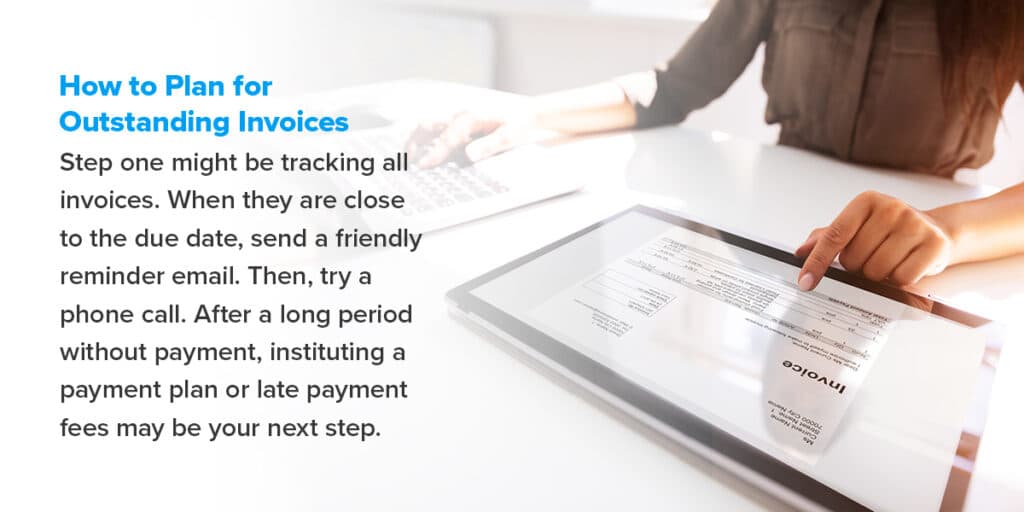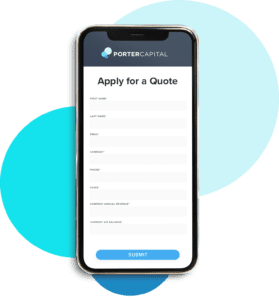Table of Contents - Quick Links
Outstanding invoices negatively impact business operations by affecting cash flow, even causing lowered credit or lack of funds. When you don’t have funds to pay employees or satisfy other business expenses, you might damage your reputation and incur fees on expenses you owe. To avoid these unfavorable circumstances, every business — large or small — must have a plan for collecting outstanding or overdue invoices.
Overdue vs. Outstanding Invoices
An outstanding invoice is still within its due date, but it hasn’t yet been paid. An unpaid invoice has passed the due date without payment. Most businesses set invoice payment terms like a net 30, meaning the invoice must be paid in 30 business days. For 30 days, the invoice is outstanding. After 30 days, the invoice becomes overdue.
Overdue invoices have a higher negative effect because they leave your business short of the money you need. Too many unpaid invoices may lead to difficulty paying your business expenses like payroll or rent. Overdue invoices also impact cash flow and can lower your chances of qualifying for financing.
Dealing with Outstanding Invoices?
Let us help you manage your outstanding invoices effectively with our specialized financial solutions.
How to Collect Outstanding or Overdue Invoices
Given the challenges that overdue invoices can bring to a business’s operations, companies should do everything possible to ensure prompt payment. Businesses often use several methods to track invoices and collect payments.
1. Identify Outstanding Invoices
Collecting money owed begins with developing a strategy to track invoices. Most accounting software allows businesses to record when invoices are sent and when they become overdue. Some software programs can even send automated payment reminders to encourage clients to pay on time.
If your accounting software lacks these features, you should develop another tracking method. Record the day you send each invoice in your calendar. Then, set a reminder to follow up when the invoice becomes overdue. When you have a reliable tracking method, you can avoid worrying about unpaid invoices until they are close to due or overdue. When an invoice becomes overdue, it’s time to move to other collection methods.
2. Send Invoice Reminders to Customers
Sometimes customers might miss an invoice. Maybe they’re out of town doing business or an invoice gets lost in their inbox. If an invoice is close to due, you can start with a friendly follow-up email reminding customers of the invoice. Many times, this gentle reminder is enough to encourage customers to pay. If they have yet to receive the invoice, they have time to pay before it becomes overdue.
If the payment date passes without customer communication, you might follow with a stricter email. You can start with an overdue notice informing clients that time has run out to pay the invoice. If they still refuse, more stringent measures may become necessary.
3. Consider a Late Payment Fee
Businesses that face late invoices can institute fees for overdue payments. Establishing penalty fees can encourage customers to pay on time because they will incur higher costs without doing so. Any fees collected can also help a business save extra cash, creating an emergency fund to cover expenses if future invoices are late. If your company currently lacks a late payment fee structure, inform customers of the new policy, then institute it on the next invoice.
Some companies also offer incentives for early payment. For example, a client might receive 1%-2% off their payment price if they pay within 10 days of receiving an invoice. This cash benefit encourages businesses to pay earlier, reducing the chance of future overdue invoices.
4. Reach out Over the Phone
Sometimes, a more personal approach can help a business receive unpaid invoices. If your company has previously sent emails, try a phone call. This approach can remind customers that the situation is serious. A personal conversation might also reveal why a customer still needs to pay. A customer might confess to a lack of funds. In this situation, you can potentially work together to develop an alternate payment plan that works for both sides.
5. Allow Partial Payment Options
If your client has cash flow problems and cannot pay an invoice, repeated emails won’t yield results. Instead, you might institute a three- to six-month payment plan, allowing clients to repay the money slowly. While you will not receive full payment immediately, you may receive enough to pay your outstanding expenses.
A payment plan only works in some cases. For example, you may never receive the full payment if a client goes bankrupt before providing the total payment amount. In each case, you can weigh the pros and cons before offering a payment plan.
How to Plan for Outstanding Invoices
Most businesses face outstanding or overdue invoices at some point, so creating a plan for how to deal with an outstanding invoice can help your operations run more smoothly. If you have tried several of the above methods and found that they work well, create a step-by-step plan using those strategies.
Step one might be tracking all invoices. When they are close to the due date, send a friendly reminder email. Then, try a phone call. After a long period without payment, instituting a payment plan or late payment fees may be your next step.
Consider Alternative Financing
While it’s best to establish a plan for outstanding invoices, you can ensure consistent cash flow by instituting other financing methods. If you fail to receive invoices on time, you will have backup funds to satisfy your business expenses. Several alternative financing methods exist, including:
- Invoice factoring: If your industry often has customers who are slow to pay, you can send invoices to a factoring company. They will typically pay around 90% of the price upfront and then work with your customers to get the outstanding amount.
- Bank loans: Established businesses with solid financial histories can seek bank or small business loans. The approval process often takes time, so this method doesn’t work well for fast cash.
- Business credit cards: If outstanding invoices leave your business with unpaid expenses, you can use a credit card to cover the amount until you receive payment.
- Cash flow loans: This loan type uses expected cash flow as collateral. Cash flow loans can help businesses with a low credit score or short financial history access necessary funds.
- Merchant cash advances: Businesses with proven credit or debit sales can borrow against future sales with a merchant cash advance company. This funding method often involves high interest and fees because it has less regulation than traditional loans.
Know the Risks of Outstanding Invoices
When dealing with outstanding invoices, businesses must know the risks so they can work to avoid them. If clients don’t pay their invoices, your business might be unable to pay its expenses due to a lack of cash flow. Overdue invoices can lead to situations like your business’s creditworthiness going down.
Long-standing debts sometimes go to debt collection or credit bureaus. When records exist of past payment failures, other companies might hesitate to do business with you. Instituting a plan for invoice collection and using alternative financing can help you pay expenses on time and avoid losing business.
Porter Capital Can Help Your Cash Flow
Companies must often wait up to 90 days to receive payment for outstanding invoices. During this time, they must pay expenses like payroll, supply needs or rent. In these situations, cash flow gaps might occur, making paying expenses difficult. If your business needs to cover unpaid invoice costs, work with Porter Capital for invoice factoring. We can provide up to 95% of your invoice price so you can continue doing business.
With over 30 years of experience in the industry, we have the necessary expertise to address your cash flow needs. To learn more about invoice factoring, contact us online today.





